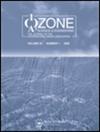Effects of Ozone Dose and Contact Time on Ozonation Process Performance for Treatment of High Rate Activated Sludge Process Effluent
IF 1.4
4区 环境科学与生态学
Q3 ENGINEERING, ENVIRONMENTAL
引用次数: 1
Abstract
ABSTRACT In recent years, there has been an increase in the interest on organic compounds originating from anthropogenic activities. The presence of these micropollutants in waterbodies can be detrimental for the aquatic organisms even at their trace concentrations. Removal of micropollutants from wastewater by conventional treatment methods is quite limited, thereby existing wastewater treatment plants are not capable of removing these micropollutants. This study investigated the removal of 27 micropollutants and conventional pollution parameters by ozonation of the effluent from a pilot-scale high-rate activated sludge system treating municipal wastewater. Different ozone dosages and contact times were tested during the study. Results revealed that 7 out of 27 micropollutants were detected in the effluent. Over 45% chemical oxygen demand (COD) removal and over 65% total suspended solids (TSS) removal were achieved by the ozonation process. Among the various ozone dosage and contact time combinations investigated in the study; 6 mg/L ozone dosage-20 min contact time, and 9 mg/L ozone dosage-10 min contact time alternatives resulted with the best treatment performance in terms of the removal of micropollutants, COD, TSS, and turbidity. A feasibility analysis was conducted to evaluate the best operational conditions from a techno-economic perspective and the results revealed that the unit cost for ozonation process ranged between 0.033 $/m3 and 0.043 $/m3. Additionally, considering the feasibility, 6 mg/L ozone dose – 20 min contact time combination was found as the optimum alternative. Based on the promising results obtained in this study, ozonation can be offered as a polishing step for the effluents of high-rate activated sludge systems for the improving of the effluent quality.臭氧剂量和接触时间对臭氧氧化处理高倍率活性污泥工艺出水性能的影响
近年来,人们对源自人类活动的有机化合物越来越感兴趣。这些微污染物在水体中的存在对水生生物是有害的,即使它们的浓度极低。常规处理方法对废水中微污染物的去除率非常有限,因此现有的废水处理厂不具备去除这些微污染物的能力。本研究通过臭氧化处理中试高效活性污泥系统处理城市污水,考察了27种微污染物和常规污染参数的去除情况。在研究中测试了不同的臭氧剂量和接触时间。结果表明,27种微污染物中有7种被检出。臭氧化处理的化学需氧量(COD)去除率达到45%以上,总悬浮固体(TSS)去除率达到65%以上。在研究的各种臭氧剂量和接触时间组合中;6 mg/L臭氧用量-20 min接触时间和9 mg/L臭氧用量-10 min接触时间对微污染物、COD、TSS和浊度的去除效果最佳。从技术经济角度对最佳操作条件进行了可行性分析,结果表明,臭氧化工艺的单位成本在0.033 ~ 0.043美元/m3之间。此外,考虑到可行性,6 mg/L臭氧剂量- 20 min接触时间组合为最佳选择。基于本研究取得的良好结果,臭氧氧化可以作为高速率活性污泥系统出水的抛光步骤,以改善出水水质。
本文章由计算机程序翻译,如有差异,请以英文原文为准。
求助全文
约1分钟内获得全文
求助全文
来源期刊

Ozone: Science & Engineering
环境科学-工程:环境
CiteScore
5.90
自引率
11.10%
发文量
40
审稿时长
2 months
期刊介绍:
The only journal in the world that focuses on the technologies of ozone and related oxidation technologies, Ozone: Science and Engineering brings you quality original research, review papers, research notes, and case histories in each issue. Get the most up-to date results of basic, applied, and engineered research including:
-Ozone generation and contacting-
Treatment of drinking water-
Analysis of ozone in gases and liquids-
Treatment of wastewater and hazardous waste-
Advanced oxidation processes-
Treatment of emerging contaminants-
Agri-Food applications-
Process control of ozone systems-
New applications for ozone (e.g. laundry applications, semiconductor applications)-
Chemical synthesis.
All submitted manuscripts are subject to initial appraisal by the Editor, and, if found suitable for further consideration, to peer review by independent, anonymous expert referees.
 求助内容:
求助内容: 应助结果提醒方式:
应助结果提醒方式:


